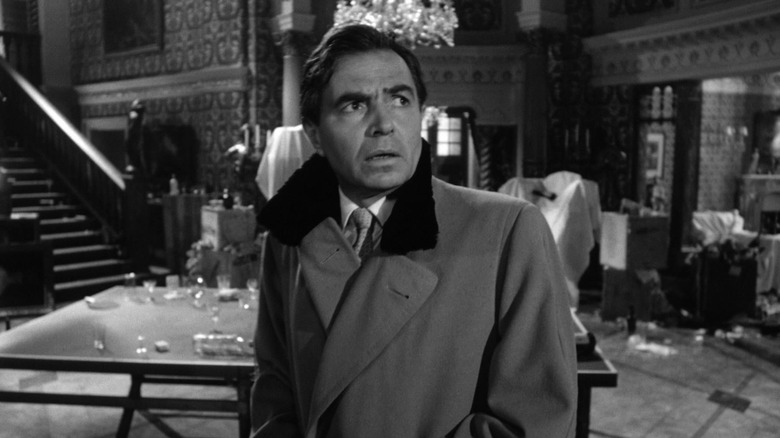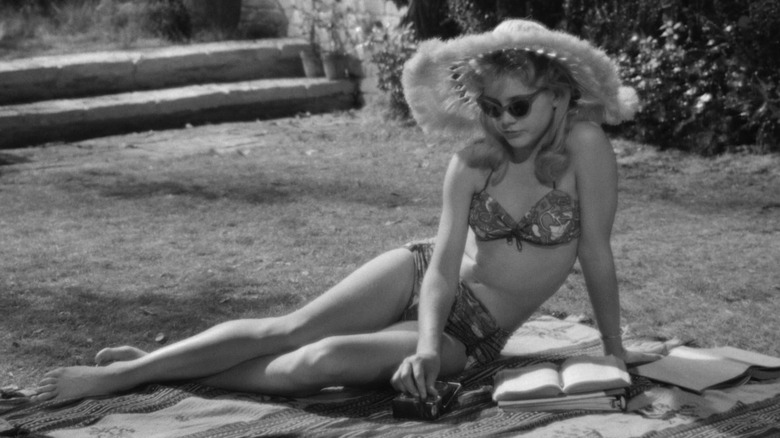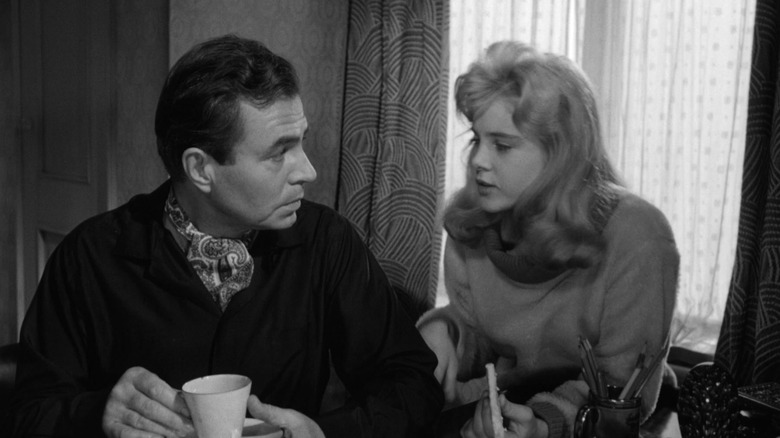Not Much Of Lolita's Screenplay Ended Up Making It To The Screen
Stanley Kubrick always had a strange relationship with authors. On the one hand, the director relied on their work to prompt his own artistic exploits. He would spend his entire career searching for stories worth adapting for the big screen as though they were some sort of finite resource that required immediate mining. Almost all of the auteur's films were adaptations of pre-existing works, with Kubrick using the time between projects to peruse the pages of publications such as the Virginia Kirkus Review in search of the next story to spark his interest.
On the other hand, he had some, shall we say, complicated interactions with the various authors of these stories that were so crucial to his process. Gus Hasford, who wrote the 1979 novel "The Short-Timers," on which "Full Metal Jacket" was based, was so unhappy with what he witnessed on the film's set he waged his own battle against Kubrick for appropriate credit on the final movie and generally made things as difficult as possible for the production. Elsewhere, Kubrick's long-gestating "A.I." project, which he eventually passed on to Steven Spielberg before his death, was set to be based on writer Brian Aldiss' short story "Supertoys Last All Summer Long." However, the director ended up using a less than honest contract trick to get out of the whole deal in order to shoot "The Shining" instead.
This pattern of relying on authors to propel his movies while simultaneously managing to enrage them in the process of adapting their stories was a constant throughout Kubrick's career. So it (almost) was back in the '60s when the filmmaker came to adapt Vladimir Nabokov's controversial novel "Lolita." Luckily, Nabokov was less enraged and more nonplussed by his experience with the inscrutable director.
Nabokov's wasted Lolita screenplay
"Lolita" caused a stir upon its 1955 publication. A taboo tale of a middle-aged man falling for his 12-year-old step-daughter failed to wow publishers, and Vladimir Nabokov had struggled to get his story printed. Stanley Kubrick, however, evidently saw "Lolita" as a "tender love story," and paid $125,000 for the rights. He asked Nabokov to write the screenplay and, after some initial hesitation, the 60-year-old Cornell professor relented, resigning his position and moving to Los Angeles to work on the script.
In 1997, Nabokov would publish his original script, accompanied by his own recollection of how it developed, which revealed he sent a 400 page screenplay to Kubrick, who told him it was "much too unwieldy" and "would take about seven hours to run." Nabokov cut his script down, sending a revised version in September 1960, with Kubrick simply deeming it "fine."
The last time Nabokov met Kubrick prior to the film's release, he was shown photos of Sue Lyon, the actor set to play the titular "nymphet" and "felt rather pleased with the way things had worked out." But Nabokov wouldn't hear from the director again until the movie, which was shot in England due to funding considerations, was complete. Days before the "Lolita" premiere in June 1962, Kubrick showed his final cut to the writer, who was surprised to find that "only ragged odds and ends" of his script had been used:
"The modifications, the garbling of my best little finds, the omission of entire scenes, the addition of new ones, and all sorts of other changes may not have been sufficient to erase my name from the credit titles but they certainly made the picture as unfaithful to the original script as an American poet's translation from Rimbaud or Pasternak."
'He saw my novel in one way, I saw it in another'
All in all, as TCM notes, Stanley Kubrick only kept around 20 percent of Vladimir Nabokov's script in the final film. You might thinks that would make Nabokov angry, considering how diligently he worked on the screenplay, which he then adapted to fit Kubrick's requirements. And at first he was a bit upset, feeling a mix of "aggravation, regret, and reluctant pleasure." But after he had time to process the experience, the author was ultimately pleased with the final project, if a bit bemused by the whole experience:
"I had discovered that Kubrick was a great director, that his 'Lolita' was a first-rate film with magnificent actors [...] When adapting 'Lolita' to the speaking screen he saw my novel in one way, I saw it in another –- that's all."
At the time, not everyone agreed that "Lolita" was a "first rate film." In fact, in response to the movie's tagline ("How did they ever make a movie of 'Lolita'?"), the New York Times replied with a simple,"They didn't." But like nearly all of Kubrick's movies, time would see critics and audiences come around to "Lolita," which is now, as writer Gene Youngblood notes, generally considered "a transitional work, marking the turning point from a naturalistic cinema ('Paths of Glory,' 'Spartacus') to the surrealism of the later films."
Ultimately, even though Kubrick had used barely any of Nabokov's script, the writer still earned an Oscar nomination for his efforts — which, considering the short shrift given to other authors who'd crossed paths with Kubrick, really isn't all that bad.


